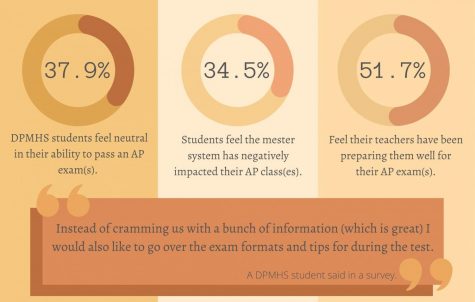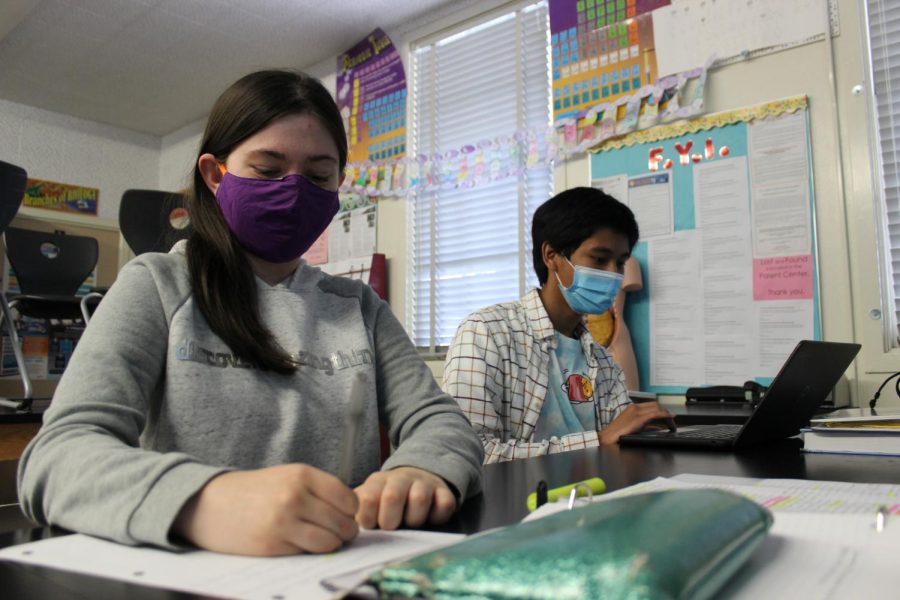Juniors Elizabeth Rose and Joseph Botti take notes in their AP Environmental Science course as the teacher, James Morrison, gives a lecture.
Shortened length of AP classes worries students, teachers
December 6, 2021
Due to the 4×4 schedule, most Advanced Placement (AP) classes have been shortened from a duration of 40 weeks to 20 weeks. This has generated distress among students.
“It would be so much easier to have it the whole year,” junior Joseph Botti said.
All AP classes at Daniel Pearl Magnet High School, except for AP World History, have been shortened to one-semester-long courses compared to lasting the whole year as they have in previous school years. Teachers are concerned that the shortened course duration will result in the students’ lack of understanding of the entirety of the required concepts. Uneasiness is settling into the students as the first semester will come to a close on Dec. 17.
“I feel that it’s very rushed because we have a very limited amount of time to get ready and it feels like we’re falling behind because of the short amount of time we have,” AP Environmental Science and AP English Language student Danielle Haiwongse said.
Because AP classes are only one semester-long, a unique challenge is presented for students taking the courses in the fall semester. After students finish their AP course in the fall semester, they go through the spring semester without reviewing the material in class. This is because the 4×4 schedule is designed to give students four new classes in the spring semester. Students are anxious that their memory of the topic might slip, reducing their chances of scoring well on the AP exam. Teachers, too, are disturbed by that possibility.
“I worry that I won’t have them for five months and that they’re going to forget a lot of what we’ve been doing,” AP English Language teacher Ron Baer said.
Science teacher James Morrison teaches AP Environmental Science (APES), a new course for DPMHS. He covers one unit per week when he would usually take one and a half to two weeks to go over a unit prior to the mester system. Morrison has been taking polls of his students to gain insight on how they are faring with the sped-up class. So far, the responses have been mostly positive. However, Morrison said that it has been difficult to condense AP Environmental Science, which covers such topics as biology, economics, chemistry, physics, sociology and law.
“They have a test every week,” Morrison said. “They have (a) lab every week. I mean, we’re doing as much as we can with the time we have.”

for the upcoming AP exams. (Gabrielle Lashley)
To remedy this “gap,” the school is planning to host virtual Saturday workshops during the spring semester to allow students to meet with their AP teachers and review material or learn additional concepts. Also, counselor Martina Torres is a proponent of AP Readiness, a program organized by the University of California, Los Angeles. The program consists of virtual workshops held on selected Saturdays when students from different schools can benefit from AP training provided by master AP instructors. These workshops started in September and will continue through the spring semester.
“I encourage our AP students to attend the Saturday workshops that will be provided because I think they’ll find that they will be extremely helpful,” Torres said.
Junior Elizabeth Rose, who is taking AP English Literature and APES, is planning to continue her current practice of congregating with fellow APES students on Google Meets to quiz each other on certain concepts and review the answers for past tests. Botti is taking APES and he is going to review Quizlet sets he has made about the course topics. Others like junior Sammy Willett, who is taking APES as well, have decided to repeatedly study their notes to keep material fresh.
“I’ll go over the material at home, like try and figure out ways to constantly keep it in my brain, whether that be going over notes, making mental notes or just writing it down somewhere,” Willett said. “It’s proved to help you memorize things.”
Torres is concerned about AP scores because of the emotional and mental stress that generally has accompanied the academic lives of students during the pandemic. She also worries that the characteristics of distance learning have led students to experience a deficiency in certain skills needed for their current AP classes.
“Students are a little bit more reluctant right now to work harder and to go above and beyond the minimum requirement right now,” Torres said. “So it’s a matter of kind of getting back into the regular pace and I don’t think we’re back on to a regular pace yet.”
Teachers such as Morrison and Baer have been assigning AP mock tests to their students to prepare them for their AP exams in May. Baer has increased emphasis on learning test-taking strategies. Additionally, students have benefitted from the teachers’ willingness to explain and tutor after class, if needed.
“The teachers are very helpful and you can just go to them at the end of class,” Haiwongse said. “I find that pretty helpful.”
Only time will tell how AP scores will be affected by the condensed courses. For now, students will have to work hard to stay afloat as the course material and AP exam rush toward them.
“The fact that I have half the time for all of (my AP classes) to study for the big test is very scary,” Rose said.
